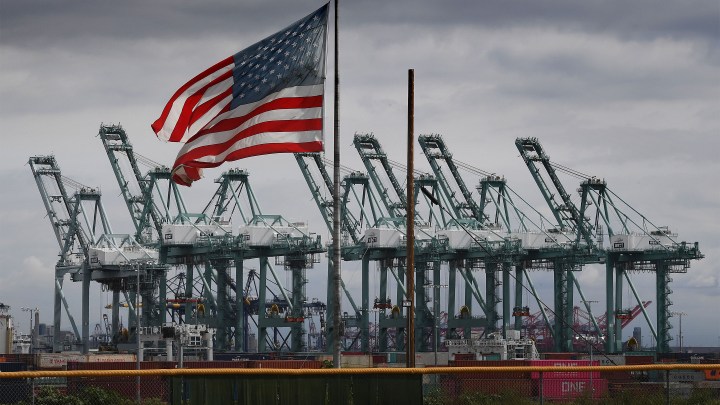
Despite deals completed and in the works, many trade conflicts remain
Despite deals completed and in the works, many trade conflicts remain

President Trump signed phase one of the U.S.-China trade deal Wednesday. NAFTA is almost replaced with the USMCA making its way through the Senate. There’s a new trade deal with Japan, too. So all the trade disputes are done, right? Not quite.
There are plenty of other fights brewing, especially between the U.S. and Europe.
“With the European Union, little progress has been made,” said Wendy Cutler, vice president of the Asia Society Policy Institute and former acting deputy U.S. trade representative. “If anything, trade irritants are building up.”
The U.S. and Europe are still fighting over jets. The World Trade Organization ruled in favor of the U.S. and said Europe was improperly subsidizing Airbus. The U.S. imposed tariffs and is threatening more. But, the U.S. isn’t exactly innocent.
“The Europeans are expecting a ruling from the WTO as well that would entitle them to retaliate against the U.S. for subsidies to Boeing,” said Dan Ikenson, director of the Center for Trade Policy Studies at the Cato Institute.
“Depending on how Europe responds, it could spiral out of control,” Ikenson continued. Jets are just the beginning, though.
“There’s a long list of issues that need to be resolved,” Cutler said. “President Trump is not happy with the imbalance in the automotive sector, in particular the fact that Europe has a 10% tariff and we only have a 2.5% tariff, for autos.”
The most red-hot issue right now is the fact that France and Italy are imposing taxes on U.S. tech companies like Google and Facebook, even though those companies aren’t based in those countries. The rationale is they’re making money off European users. A few months ago, President Trump said he was not happy about that.
“I’m not happy about the fact they are taxing our companies. I’m not a fan of those companies, but if anybody’s gonna tax those companies, it should be the U.S.A., not France and the European Union,” Trump said.
“There’s a long list of issues that need to be resolved.”
Wendy Cutler, vice president of the Asia Society Policy Institute
Gary Hufbauer, a senior fellow at the Peterson Institute, said any of these conflicts with Europe — and these are not even close to being all of them — could escalate, “because the Europeans will not be pushed around by the U.S.”
Hufbauer said Europe has a lot more leverage than Mexico or Canada. There may be an incentive to keep things calm before the election. Unless there isn’t.
“This is all dependent on how the president perceives the escalation and tension with the E.U., whether that will be a political benefit to him,” said Eric Altbach, senior vice president at Albright Stonebridge Group.
On the one hand, there’s a political cost to tariffs that hurt some U.S. businesses, but on the other, it could be a good look to stand up to unfair treatment, as the president puts it.
“We should probably mention the fact the WTO is melting down,” Altbach said.
The U.S. has basically shut down the World Trade Organization’s highest court of appeals, meaning no decisions can be effectively appealed or finalized. That’s put it at odds with much of the rest of the world. All of this is to say 2020 is as much of a trade minefield as 2019 was.
There’s a lot happening in the world. Through it all, Marketplace is here for you.
You rely on Marketplace to break down the world’s events and tell you how it affects you in a fact-based, approachable way. We rely on your financial support to keep making that possible.
Your donation today powers the independent journalism that you rely on. For just $5/month, you can help sustain Marketplace so we can keep reporting on the things that matter to you.


















